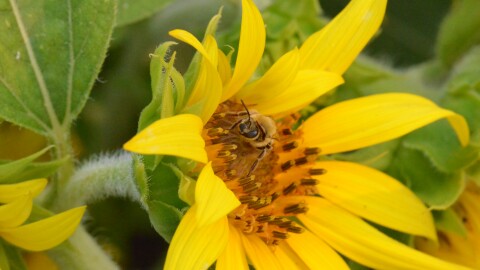-
Wild bees across the west face a growing threat from microscopic parasites. Last week an Oregon researcher visited USU’s Ecology Center to discuss her findings.
-
A collaborative study between USU professor Dr. Scott Hotaling and Seattle University professor Dr. Eric Gilbertson explores how mountains are changing with the warming of the planet.
-
New research from the University of Utah warns that carbon credits are typically misleading and points towards alternative solutions.
-
Plastic is everywhere, but the effects of plastic pollution on the environment are not well-understood.
-
Historically, an “everyone is a VIP” philosophy made good business sense for Disney amusement parks. But now Disney is embracing tiered services. Daniel Currell explains why and what’s to come.
-
Again and again, similar patterns show up in nature in different creatures at different times in their evolutionary histories—even when those life forms have evolved on much different paths for hundreds of millions of years. And when they show up, as it turns out, we often perceive them as beautiful. So, the question is: Why?
-
Again and again, similar patterns show up in nature in different creatures at different times in their evolutionary histories—even when those life forms have evolved on much different paths for hundreds of millions of years. And when they show up, as it turns out, we often perceive them as beautiful. So, the question is: Why?
-
Again and again, similar patterns show up in nature in different creatures at different times in their evolutionary histories. And when they show up, we often perceive them as beautiful. Why?
-
Water monitoring devices have been installed across Utah to measure and monitor surface water. The U. S. Geological Survey maintains these tools to provide data to water managers and the public.
-
Deep in the ocean, jellyfish, shrimp, fireworms and other creatures use multi–colored lights for defense, luring food, attracting mates, and communication. In their new book, Steven Haddock and Sönke Johnsen explore the nature of underwater light—investigating the varieties of transparency, pigmentation, iridescence, bioluminescence, and fluorescence found in the watery beyond.
-
Deep in the ocean, jellyfish, shrimp, fireworms and other creatures use multi–colored lights for defense, luring food, attracting mates, and communication. In their new book, Steven Haddock and Sönke Johnsen explore the nature of underwater light—investigating the varieties of transparency, pigmentation, iridescence, bioluminescence, and fluorescence found in the watery beyond.
-
The Trump administration is seeking an across-the-board 20% cut to NASA's total funding, and nearly all of that reduction is concentrated in science mission directorate.














